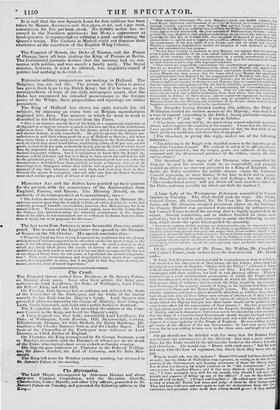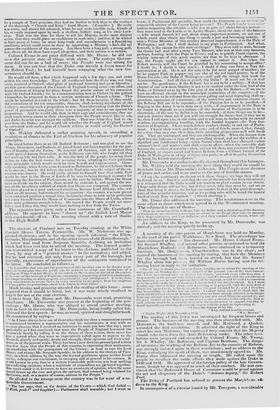A large body of the Westminster Reformers assembled in Covent
Garden on Tuesday. The High Bailiff took the chair. Mr. Hume, Colonel Evans, Mr. Crawfurd, Mr. De Year, Dr. Bowring, Colonel Jones, and Mr. Simpson occupied prominent places on time busting:. Sir Franeis Burdett was prevented from attending by indisposition; but Colonel Evans assured the meeting that he highly approved of its object. Several resolutions, and an address founded on them, were agreed to ; but it will ise only- necessary to quote the following re:elu- tion, which shows the spirit which guided the assembly.
Tilst ie the opinion of this meeting, no Adrniuistration can be expected to MI the hmg elielished wishes of the People of England, or qualified to corrsolidate Iir liberties, relieve their present distresses, and secure their fidure welfare, which is not prepared to perfect the Reform Bill, to restore Triennia Parliaments, aad ',remote tho adoption of more extended suffrage, alai the vote by Ballot, mu, work out the reform of ;ill co..porate abuses, and of all abuses in the Church establishments of Great It it II awl Ireland. aunt to entirely repeal all taxes pressing upon productive inda,try and }mon lauLe."
Of the speeches, those of Mr. triune, Mr. Wakley, Mr. Crawfurd, and Colonel Evans, seem to have been the best received. Mr. Hums said—
lie knew *bat the present meeting would be as unanimous as that at which I:e had attended in his own par ish of 2slarylehone, the day before; when they irad
proclaimed in a voice of thunder, " Down with the Tories!" ( Cheers.) Away with all absurd distinctions between Whig arid Tory. Let them no longer be humbugged with these epithets, but look to real practical objects. What he required was a good constitutional governmeut, in which the People should have the influence to whialr they were entitled, in which the Peers should have their prriper share of influence, and in which the King should be the indepen- dent Sovereign of the country, instead of being, as he hitherto had been, s ah• sereient to the Peers arid the Mateo Borough system. The question was not whistler sinecures and useless places should be abolished, or whether they should have cheap corn (for all these things were certain of attainment if they dal nut allow themselves to be interrupted in their career of reform), but whether tile means which his Majesty had pro into their hands should not be perfected aud cariied into effect for the regeneration of their country ? The late proceediegs in high places might meet the approval of the Emperor Nicholas, the Emperor of Austria, and such characters; but it was nut to be tolerated in a free country, that the King uf a Constitutional Government should dismiss his legal and re- sponsible advisers, without any fault on their part, and while they possessed the support ot a large majority of the People of England. He was willing to for- get many of the offences of the late Government: he had- seen many black leaves, but he was willing to turn over to the clean ones, and forget what had passed. peel& should not be deluded with the story that Sir Robert reel was to have the construction of the Ministry: that was a mere subter- fitge, for the Duke would be the adviser, the leader at the Horse Guards and elsewhere. lie would cry, " Down with such men ; " but be Was led away with the heat of argument, for, thank God, they were not up yet. Who, he would ask, was the Agitator? Daniel O'Connell had been described 69 such ; but the Duke of Wellington was a greater, in seizing as he did all the powers of the Government, and keeping possession of them for fifteen days. For all that was known, he might continue to be " the Government" in his own person, for another fifteen ; and if this were allowed, why might he net say, " I have managed very well for one month, why should I Out save the trouble and expense of filling up any of the offices? I can do the duties. them all well enough." ( Chars and laughter.) lie called upon the nweung
look at what the Tories had done, and judge of them by their former acts. They had been told over and over again to wait for declarations from the Go- vernment, aid promises were made that reform should go on: if they wisLed
for a sample of Tory promises, they had no further to look than to the couduet of the thorough "Church and King" Lord Mayor. (Laughter.) He really was sorry, and almost felt ashamed, when be Saw some sensible non, friends of his, so easily impoesed upon by such a shallow, hollow man as his civic Lord- ship. That was the time for them to tell his Majesty, ;11 the most distinct terms, that they would place no confidence in such men ; and that if be wished to have peace at home, he must keep trade and manufactures in a flourishiag condition, which could never be dune by appointing a Ministry ti hieh did not possess the confidence of the country. Let them have a long pull, a strong pull, but, above all, let them have a pull altogether, and their SUCCeSS was certain.
Colonel Evans in one point differed with Mr. Hume: he did not eiew the present state of things with alarm. The embryo Govern- ment did not lie on a bed of roses : the People were too strong for them. It was not true that the Duke was merely a tocem tenens for Sir Robert Peel ; he had himself been arranging what the new Go- vernment should do.
He would tell them a fact which happened only a few days ago, and came within his own knowledge. They all recollected how the Dike was, not long since, received at Oxford—that place of profound learning and grt at liberality : yet this great champion of the Church of England having come into office, and being desirous of keeping his place, forgot the precise nature of his connexion with his Oxford friends; for in a communication sent to Oxford by the gallant Chancellor, he proposed to them a certain modicum of Church le form. This inieht be intended as a tub to the whale ; but let them imagine, if they could, the contortions of the ten respectable, demure, sleek-looking dignitaries of the Colleges, receiving such a proposition as this. Notwithstanding that the Duke's power of persuasion was great, there was a majority of nine to one against hie proposition. Arid he would add, that, in their sage and astonishment, they ap- plied much worse names to their champion than the People would like to use, and Jades Iscariot was amongst the epithets. That was what they had to ex- pect from the Duke; and he would ask whether the People of England would he contented with such a plan of Church reform as would satisfy the Doctors of Oxford?
Mr. Wakley delivered a rather amusing speech, in seconding a resolution of thanks to the Earl of Durham for his advocacy of popular principles.
He stood before them as an old Radical Reformer ; and was glad to see the Whigs, Reformers, and Radicals, all joined hand and heart together for the pur-
pose of keeping out the Tories. He detested all factions, and he wished they would quarrel among themselves, as the Kilkenny eats did, who fought till they bad nothing left but their tails. It was the duty of the people, knowing their
ri-hts, to take the best course for securing them, adopting for their guidance those principles which would work for their benefit and improvement. Gene- rally speaking, when Lords canoe forward as Reffirmers, he did not believe them
to be sincere; but he did believe the noble Earl who was the subject of the re-
!elution was sincere. He could easily picture to himself how that noble Earl would be met in the House of Lords if be was to bring forward measures for
shortening the duration of Parliaments, or the vote by Ballot. When the House came to divide on the subject, there would be contents 1, and against the mo- tion all the hereditary rubbish of which that House was composed. The country had been placed in a most awkward situation, because Lord Althorp, who was called an old woman, had tendered his resignation : the country was now placed in en awkward position a second time, because he chose to take up his petticoats and carry himself from the House of Commons into the Muse of Lords, where there were petticoats enough before. He trusted the People would act man- fully ; and if they did, they would have nothing to fear from the Tories.
The reporters have given only a few sentences of Mr. Crawfurd's address. He appears to have "shown sip" the foolish Lord Mayor with considerable effect. The meeting closed with a vote of thanks to the High Bailiff.





















 Previous page
Previous page